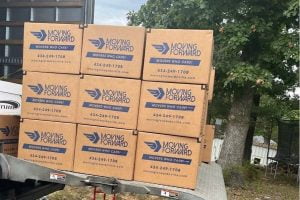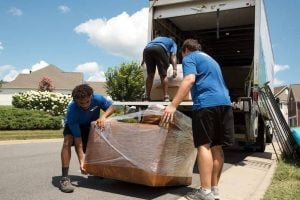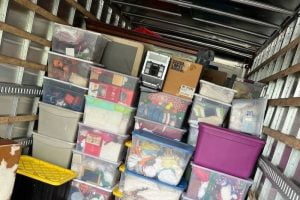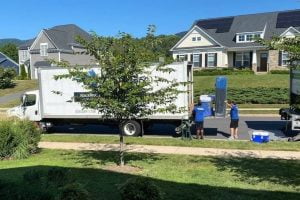Planning a house move can be a daunting task, but with a detailed approach, it becomes manageable and even smooth. Starting preparations at least eight weeks in advance can significantly reduce stress. Creating a timeline and a day-by-day schedule ensures that no crucial steps are overlooked.

Packing should begin with items that are not frequently used, allowing ample time to address any special requirements for valuable possessions. A well-maintained moving binder can keep track of estimates, receipts, and other vital documentation. This strategic organization not only simplifies the process but also ensures that important items are securely managed.
Moreover, a move is an opportune moment to clean items like rugs, drapes, and slipcovers. Freshening up these belongings ensures that they are ready for the new home. Planning and organizing these elements effectively lays the groundwork for a seamless transition.
Developing a Comprehensive Moving Plan

Planning a house move effectively requires creating a detailed timeline, selecting a reliable moving company, and budgeting appropriately. Each of these elements plays a vital role in ensuring a smooth transition.
Creating a Timeline
An organized timeline is essential for managing all moving tasks systematically. Start planning at least eight weeks in advance. Week 8: Initiate by researching moving companies and organizing essential documents. Week 7: Declutter and donate or sell unwanted items. Week 6: Collect packing supplies.
Week 4: Begin packing non-essential items like seasonal clothes. Week 2: Confirm moving details with the mover and notify utility companies about your move. Week 1: Pack essentials and prepare an emergency kit for moving day. Moving Day: Oversee the moving process and perform a final walk-through.
Choosing the Right Mover
Selecting a trustworthy mover involves evaluating multiple companies. Step 1: Research several movers online and read reviews. Step 2: Obtain at least three quotes from different moving companies. Step 3: Verify credentials by checking their licenses and affiliations with moving associations.
Step 4: Discuss services offered, including packing and insurance options. Step 5: Ensure you get a written estimate and understand the terms completely. Consider factors such as reputation, pricing, and services offered. Engage with the movers to gauge their responsiveness and professionalism.
Budgeting for the Move
Creating a moving budget ensures you manage expenses effectively. Category 1: Moving Company Fees: Include costs for packing services, transportation, and insurance. Category 2: Packing Supplies: Allocate funds for boxes, tape, and protective materials.
Category 3: Travel Costs: Plan for gas, lodging, and meals if it's a long-distance move. Category 4: Deposits and Utilities: Consider costs like security deposits and initial utility setup fees. Category 5: Miscellaneous Expenses: Account for surprise costs such as pet care or temporary storage.
Monitor your budget closely and adjust if necessary to avoid financial strain. Clear planning and tracking will help keep your move financially manageable and stress-free.
Preparation Steps Before the Move

Before moving, there are several crucial steps that can make the process smoother. These include decluttering, adopting effective packing strategies, and managing utilities and address changes.
Decluttering the House
Starting by decluttering makes the packing process simpler and more efficient. Walk through each room and decide what to keep, donate, or discard. Items that haven't been used in the past year should be reconsidered. Creating piles for sell, donate, and trash helps streamline this step.
Using labels and clear bins can help organize the items to be kept. Reducing the volume of possessions means fewer items to pack and move, potentially saving time and money.
Packing Strategies and Tips
Begin by packing items that are rarely used, such as seasonal decorations or specialty kitchen appliances. Use quality packing materials and label each box with its contents and the room it belongs to. Fragile items should be wrapped in bubble wrap or packing paper.
An inventory list helps to track all items during the move. Numbering boxes can also ensure that everything arrives at the new location. Items of high value should be taken personally or insured.
Handling Utilities and Address Changes
Having a plan for utility transfers and address updates is essential. Contact utility providers to schedule the disconnection of services at the old residence and connection at the new home. This includes electricity, water, gas, internet, and waste services.
Inform important institutions like banks, insurance companies, and the post office about the address change. Ensure all mail is redirected to the new address. Setting reminders for these tasks can prevent last-minute hassles and ensure a seamless transition.
Moving Day Essentials
Preparing for moving day involves ensuring that everything is packed and ready, as well as making important final checks and considerations. It's crucial to be well-organized and have all necessary items easily accessible to ensure a smooth transition.
Final Walkthrough and Essentials Kit
Before the movers arrive, conduct a final walkthrough of your home. This ensures that nothing is left behind and all items are properly packed. Pay special attention to easily overlooked areas like closets, cabinets, and drawers.
An essentials kit is vital. Include items you’ll need immediately at the new place:
- Toiletries (toothbrush, toothpaste, soap, toilet paper)
- Basic kitchen supplies (plates, utensils, a few snacks)
- Chargers for phones and other devices
- Important documents (ID, moving contracts)
Organize these in a clear, marked box or bag that stays with you during the move. Consider a Free printable moving checklist to ensure no crucial items are forgotten.
Transportation and Safety Considerations
Ensure your transportation logistics are secure. This includes having a clear route planned to your new home and any parking arrangements sorted for moving trucks. If you’re driving, ensure your vehicle is in good condition and ready for the trip.
Safety is paramount. Keep a first aid kit accessible in case of minor injuries. Securely pack any hazardous materials and ensure they are transported safely. Make sure moving heavy items follows proper lifting techniques to prevent injury.
Consider the well-being of any pets during the move, ensuring they have a safe, comfortable space and are not stressed by the process. Always check for changes in weather that might affect your move and prepare accordingly.
Adjusting to Your New Home
Settling into a new home involves both physical and emotional adjustments. Unpacking strategically and integrating into your new community are essential steps for a smooth transition.
Unpacking and Home Organization
Unpacking should be systematic. Begin by prioritizing rooms that are essential for daily living such as the kitchen, bathroom, and bedroom. Setting up these areas first helps create a functional living environment quickly.
Use labeled boxes to identify items easily. This minimizes stress and helps to quickly locate important belongings. Storage solutions like shelves and baskets can keep things organized and decluttered.
Consider lighting. Good lighting affects the ambiance and usability of your space. Install a mix of overhead and task lighting to enhance different activities in your new home.
Cultural and Community Integration
Integrating into a new community can be challenging, especially when relocating out of state or to a new city. Attending local events and joining community groups can expedite social integration.
Learn about local customs and popular locations. Finding favorite spots for groceries, coffee, and dining helps create a sense of familiarity. Introducing yourself to neighbors can also build a local support network.
Participate in local activities to foster connections. Volunteering or joining clubs can provide both social interaction and a sense of belonging in your new community. This active engagement is key to feeling at home.
Moving Forward Movers - Your Trusted Moving Partner in Charlottesville
Moving Forward Movers is a premier choice for long-distance moving nationwide, renowned for their hassle-free moving solutions. Boasting over ten years of industry expertise, they are a trusted apartment and residential moving company in Charlottesville and Richmond.
What distinguishes Moving Forward Cville Movers is their unwavering dedication to personalized customer service as a local, boutique-style business. Clients enjoy consistent and direct communication, collaborating with the same committed team throughout the entire moving process. This tailored approach guarantees a smooth and meticulously organized relocation journey.
Opting for Moving Forward Movers means placing your move in the hands of professionals who prioritize your unique needs. They offer transparent communication, ensuring a stress-free experience from start to finish. For a seamless long-distance move customized to your preferences, Moving Forward Movers is the ultimate choice.
















